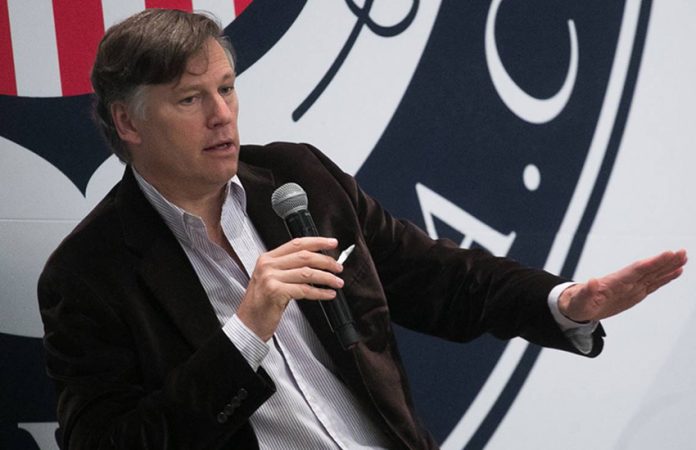President López Obrador sees combating cartels as a distraction from his political agenda and has adopted a laissez-faire attitude toward them, according to former ambassador to Mexico Christopher Landau.
Speaking at a roundtable event organized by the Council of American Ambassadors, Landau said that cartels are a “big problem in Mexico,” adding that they have effective control over large parts of the country.
“The estimates go anywhere from 35–40% of the country,” said the former ambassador, who served in Mexico for about 1 1/2 years before leaving the position in January due to the change of government in the United States.
“… President López Obrador … has a very ambitious domestic agenda, which is mostly about social programs; it’s kind of like he wants his great society in Mexico,” Landau said, comparing the government’s agenda to the “Great Society” agenda pursued by former U.S. president Lyndon Johnson.
“He sees the cartels, … to continue the analogy, as his Vietnam, which it has been for some of his predecessors, and so I think … he sees that as a distraction from focusing on his agenda,” he said.
“So he has basically adopted a pretty laissez-faire attitude towards them, which is troubling to our government, obviously. I think it’s a big problem for Mexico.”
Landau added that cartels have become “quite brazen,” citing the Jalisco New Generation Cartel’s attack on Mexico City Police Chief Omar García Harfuch last June.
“… There had never been a brazen attack like that in the heart of Mexico City, and somewhat to my shock, the Mexican central government basically did nothing,” he said.
“They didn’t say ‘Enough is enough; we can’t put up with this.’ AMLO is very insistent on trying to avoid that kind of conflict,” Landau said, referring to the president by his nickname.
He also referred to the government’s decision to free the son of convicted drug trafficker Joaquín “El Chapo” Guzmán after the Sinaloa Cartel launched an offensive against government forces in Culiacán in October 2019.
“They don’t really have much of a great police force in Mexico, so a lot of actions are done by the Mexican military, even domestic actions. They kind of sent a military SWAT team in … and they had captured him [Ovidio Guzmán] and then, almost within minutes, his organization had surrounded the perimeter of the area and taken hostages, and basically the Mexican government backed down and let him go because they didn’t want to have more widespread bloodshed in Culiacán,” Landau said.
“It was just a terrible moment, but the truth is the Mexican military was outgunned, and one of my concerns as ambassador was to try to address the flow of illegal weapons from our country into Mexico, which allows the cartels to be armed to the teeth.”
The former ambassador went on to say that Mexican cartels are a “real menace” to both Mexico and the United States but the U.S. can’t solve the problem on its own “in somebody else’s sovereign country.”
“The Mexicans are very nationalistic; they’re not going to let the Americans in to take care of the cartels. Believe me, President Trump literally offered that point-blank to President López Obrador. He says, ‘Listen, I’ll send our people down whenever you give me the green light, and we will take out the cartels.’ I’m not sure it’s that easy because I think if you cut the head off the snake, the snake has five heads all of a sudden,” Landau said.
“But I do think that there is more that we have to do in both countries to try to weaken these organizations, particularly on the money front.”
Later in the virtual roundtable, Landau said that López Obrador triumphed at the 2018 election because the Institutional Revolutionary Party, which ruled Mexico for much of the 20th century and between 2012 and 2018, and the National Action Party, which was in office from 2000 to 2012, brought no “substantial change” to Mexico.
“AMLO is totally a creature of Mexican domestic politics. Trump had nothing to do with AMLO’s rise to power. It was basically a failure of the two parties, … there was no substantial change, and the average Mexican was fed up with corruption and turned to AMLO, who was kind of one of these perennial candidates … but he offered real change, and he’s giving them some pretty significant change,” he said.
Landau has previously been critical of changes the federal government has made to foreign investment rules, particularly in the energy sector.
The former ambassador, who became something of a social media celebrity during his time in Mexico due to his frequent Twitter posts about his love of the country, also told last week’s roundtable that the first time he met with López Obrador the president told him that he was a “domestic president” and “not really interested in international affairs.”
“[He said] ‘I think the best foreign policy is domestic policy,’ and I think he’s been very true to that. … Whatever AMLO’s flaws, he’s certainly not looking to play a big role on the international stage, unlike a [Hugo] Chávez, who always wanted to do that,” Landau said.
Asked about Landau’s comments during Wednesday’s press conference, López Obrador said Mexico and the U. S. have distinct conceptions of how to deal with organized crime. He suggested that the U.S. might prefer to destroy them by “extermination or massacre.”
“[But] not us. Our government is humanist and we want to obtain peace through justice.”
López Obrador also rejected Landau’s claim that cartels control up to 40% of the country. “It’s an exaggeration. With all respect, that’s not the case.”
Mexico News Daily
